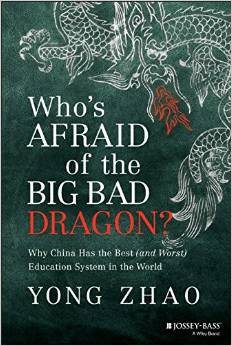 When President Obama made his first trip to South Korea in 2009, he created a national buzz by declaring his deep admiration for the South Korean education system. And how could he not, with its stedfast students and astronomical test scores? Since then, Obama has repeatedly reaffirmed his call for the U.S. to learn from education systems like South Korea’s.
When President Obama made his first trip to South Korea in 2009, he created a national buzz by declaring his deep admiration for the South Korean education system. And how could he not, with its stedfast students and astronomical test scores? Since then, Obama has repeatedly reaffirmed his call for the U.S. to learn from education systems like South Korea’s.
Back in 2009, I found this deeply ironic: At the time, I was living in South Korea and worked at a private English academy. The company’s main selling point was advertising a unique, “American-style” curriculum in which students engaged in critical thinking and problem-solving as opposed to rote memorization and test prep – educational emphases that nearly every teacher, student, and parent I met in Korea realized would not make their country globally competitive for much longer.
Now, working in the U.S., I often hear the argument that we desperately need to learn from, admire, and emulate education systems like South Korea’s. And I must say, I’ve long been confused by this mutual envy. Do we have such diverging needs? Does one system really have it right? Or is it just that the grass really does look greener on the other side?
 Last week, my class had the opportunity to Skype with Yong Zhao, professor at the University of Oregon and author of Who’s Afraid of the Big Bad Dragon: Why China has the Best (and Worst) Education System in the World. According to Zhao, South Korea isn’t the only country the U.S. has been admiring; it turns out the grass looks greener in China as well.
Last week, my class had the opportunity to Skype with Yong Zhao, professor at the University of Oregon and author of Who’s Afraid of the Big Bad Dragon: Why China has the Best (and Worst) Education System in the World. According to Zhao, South Korea isn’t the only country the U.S. has been admiring; it turns out the grass looks greener in China as well.
In Directions of Change: Why the United States and China are Moving in Opposite Directions, Zhao observed that, “China has been making its education system more American, while America has been “de-Americanizing” its system in an effort to make it more Chinese.”
According to Zhao, while the U.S. is “moving toward centralization, standardization, and reliance on testing” (e.g. NCLB, Common Core, and the newly implemented PARCC exam) China has already tried this approach, realized its limitations, and is now doing just the opposite:
“Having already had a uniform national curriculum, high-stakes testing, and centralized government control of schools for a long time, [China] has not seen the kind of talents it desires and needs in order to transition from an economy once built on abundant and cheap labor to one that relies on creative and entrepreneurial talents…. As a result, China views high-stakes testing as the primary culprit in its inability to cultivate creative and entrepreneurial talent.”
Yes, read that quotation again: The U.S. is actively and consciously emulating an education system that was designed around producing abundant and cheap labor. At the same time, China, much like Finland, is readying its education for the realities of the 21st century by embracing American educational innovations.
Zhao spoke to our class about the danger of these misguided reforms. In the U.S., we tend to think that we have little to learn from the education systems of other countries – that our context is just too different, too unique, too (dare I say) “exceptional.” However, this is truly a case when one really does have to wonder: Why does the U.S. seem so set on moving back in time when everyone else is moving forward?
Feel free to comment below, or visit the blog’s Facebook page.
Follow on Twitter @chriskbacon
I actually think the US and China can both learn from each other, and maybe instead of completely switching teaching and testing methods will end up with hybrid systems that are actually very similar and stronger than either system as it is today. The US definitely does a much better job emphasizing critical thinking and problem solving skills vs rote memorization. However, it seems like China pushes students harder and expects more from them. Standardized testing and memorization is emphasized more, but it does seem like students have retained more information and better mastered many subjects more than US students.
Good points! I like the idea of a hybrid system, though it doesn’t seem to be headed that direction in the U.S. But I do like your point about retaining and mastery – I’ve noticed that as well.